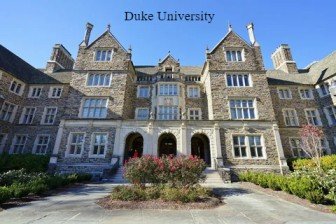Duke University holds a prestigious position among the top educational institutions globally, renowned for its academic rigor, innovative research, and commitment to excellence. Established in 1838, Duke has evolved into a beacon of intellectual pursuit and societal impact, attracting scholars, researchers, and students from around the world.
History and Background
Founding of Duke University
The roots of Duke University trace back to the establishment of Brown’s Schoolhouse in 1838. Later known as Trinity College, it was rechristened Duke University in 1924 in honor of James Buchanan Duke, a prominent tobacco and electric power industrialist who endowed the institution generously.
Growth and Development
Over the years, Duke University has witnessed remarkable growth and development, expanding its academic offerings, enhancing infrastructure, and cementing its position as a leader in higher education. Its journey from a small rural campus to a world-class research university is a testament to its resilience and vision.
Campus and Facilities
Location and Setting
Nestled in the vibrant city of Durham, North Carolina, Duke University boasts a picturesque campus spread across 8,693 acres of land. Surrounded by lush greenery and architectural marvels, the university provides an inspiring environment conducive to learning and exploration.
Architectural Highlights
The campus architecture blends traditional and modern elements, featuring iconic landmarks such as the Duke Chapel, Cameron Indoor Stadium, and the Sarah P. Duke Gardens. Each building is meticulously designed, reflecting the university’s rich heritage and commitment to aesthetic excellence.
Notable Facilities
Duke University houses state-of-the-art facilities, including research laboratories, libraries, and athletic complexes, equipped to support diverse academic pursuits and extracurricular activities. The Duke Libraries, comprising several specialized collections, serve as invaluable resources for students and scholars alike.
Academic Programs
Undergraduate Programs
Duke University offers a comprehensive range of undergraduate programs spanning arts and sciences, engineering, business, and more. With a focus on interdisciplinary learning and hands-on experience, students receive a well-rounded education that prepares them for success in their chosen fields.
Graduate and Professional Schools
In addition to undergraduate education, Duke is home to several prestigious graduate and professional schools, including the Fuqua School of Business, the School of Law, and the School of Medicine. These schools uphold the highest standards of academic excellence and foster innovation in research and practice.
Research and Innovation
Research Centers and Institutes
Duke University is at the forefront of groundbreaking research across various disciplines, supported by numerous research centers and institutes. From biomedical engineering to environmental science, faculty and students collaborate on projects that address complex global challenges and drive innovation.
Notable Contributions
The university’s research endeavors have led to significant advancements in fields such as medicine, technology, and public policy, earning international acclaim and recognition. Duke researchers are known for their pioneering work in areas such as genomics, cancer treatment, and sustainable development.
Student Life
Extracurricular Activities
Beyond academics, Duke University offers a vibrant array of extracurricular activities, including student clubs, performing arts groups, and community service initiatives. These activities provide students with opportunities for personal growth, leadership development, and cultural enrichment.
Residential Life
The university’s residential communities foster a sense of belonging and camaraderie, with students living and learning together in close-knit environments. Residential assistants and faculty mentors provide support and guidance, ensuring that students thrive both academically and socially.
Community Engagement
Duke University is deeply committed to community engagement and social responsibility, partnering with local organizations to address pressing social issues and promote positive change. Through service-learning projects and outreach programs, students make meaningful contributions to the wider community.
Faculty and Alumni
Notable Faculty Members
Duke’s faculty comprises world-renowned scholars, scientists, and thought leaders who are passionate about teaching and research. With expertise across diverse fields, they mentor students and drive innovation through their groundbreaking discoveries and contributions.
Distinguished Alumni
Duke University boasts an impressive roster of alumni who have excelled in their respective fields and made significant contributions to society. From Nobel laureates to Pulitzer Prize winners, Duke alumni are leaders and trailblazers, leaving a lasting impact on the world.
Global Reach and Partnerships
International Initiatives
Duke University has a global footprint, with international partnerships and collaborations spanning continents. Through exchange programs, research collaborations, and study abroad opportunities, students and faculty engage with global issues and perspectives, enriching their academic experience.
Collaborations with Other Institutions
The university actively collaborates with other academic institutions, government agencies, and industry partners to address complex challenges and drive innovation. These collaborations facilitate knowledge exchange, interdisciplinary research, and the translation of ideas into impactful solutions.
Impact and Recognition
Awards and Rankings
Duke University consistently ranks among the top universities worldwide, earning recognition for its academic excellence, research impact, and societal contributions. Its commitment to excellence in teaching, research, and service has garnered numerous accolades and prestigious awards.
Contributions to Society
Beyond academic achievements, Duke University is dedicated to making a positive difference in society through innovation, leadership, and service. Whether through healthcare initiatives, environmental sustainability efforts, or social justice advocacy, Duke strives to create a more equitable and sustainable world.
Diversity and Inclusion Efforts
Duke University is committed to fostering a diverse and inclusive community where all members feel valued, respected, and empowered to succeed. Through initiatives, programs, and resources, the university promotes diversity, equity, and inclusion at all levels of the institution.
Commitment to Diversity
Diversity is not just a goal but a core value at Duke University, where diverse perspectives and experiences enrich the learning environment and drive innovation. The university actively recruits and supports students, faculty, and staff from diverse backgrounds, recognizing the strength that comes from embracing difference.
Admissions Process
Application Requirements
Prospective students undergo a rigorous admissions process, which includes submitting standardized test scores, academic transcripts, essays, and letters of recommendation. The admissions committee considers each applicant’s academic achievements, extracurricular involvement, and personal qualities in the selection process.
Admission Statistics
Duke University is highly selective, with acceptance rates varying by program and academic year. While academic excellence is paramount, the university also seeks students who demonstrate leadership potential, intellectual curiosity, and a commitment to making a positive impact on the world.
Financial Aid and Scholarships
Available Resources
Recognizing the importance of affordability in higher education, Duke University offers a range of financial aid options to eligible students, including grants, scholarships, loans, and work-study opportunities. The university is committed to ensuring that all students have access to the resources they need to pursue their educational goals.
Support for Students
In addition to financial aid, Duke provides comprehensive support services to help students navigate the financial aid process, manage their expenses, and plan for the future. From financial literacy workshops to one-on-one advising, students receive personalized assistance every step of the way.
Alumni Network and Career Services
Duke University’s extensive alumni network provides valuable connections and networking opportunities for students and graduates alike. Alumni mentors, career fairs, and networking events facilitate meaningful interactions and help students explore career paths, secure internships, and launch their professional careers.
Career Development Programs
The university’s career services office offers a range of resources and programs to support students in their career development journey. From resume writing workshops to mock interviews, students receive tailored guidance and support to help them achieve their career goals and aspirations.
Future Plans and Initiatives
Vision for Growth
Looking ahead, Duke University remains committed to advancing its mission of education, research, and service on a global scale. With a focus on innovation, collaboration, and excellence, the university continues to push boundaries, tackle complex challenges, and shape the future of higher education.
Strategic Goals
Duke’s strategic plan outlines ambitious goals and initiatives aimed at enhancing academic excellence, fostering diversity and inclusion, expanding research endeavors, and strengthening community partnerships. By staying true to its core values and embracing innovation, Duke strives to remain a leader in higher education for generations to come.
Conclusion
In conclusion, Duke University stands as a testament to the power of education to transform lives and drive positive change in the world. With its unwavering commitment to excellence, innovation, and service, Duke continues to inspire and empower future generations of leaders, thinkers, and global citizens.




